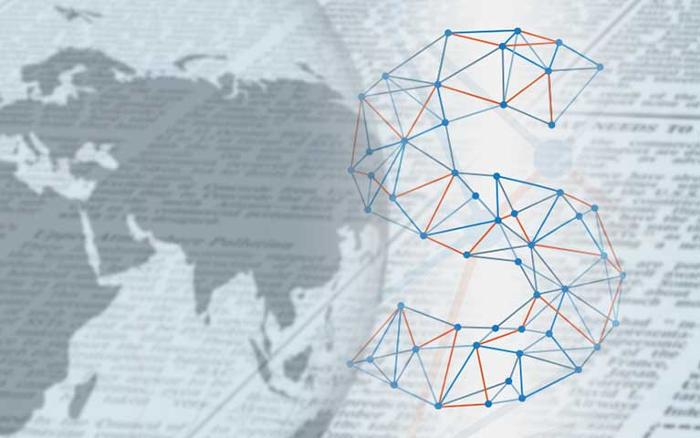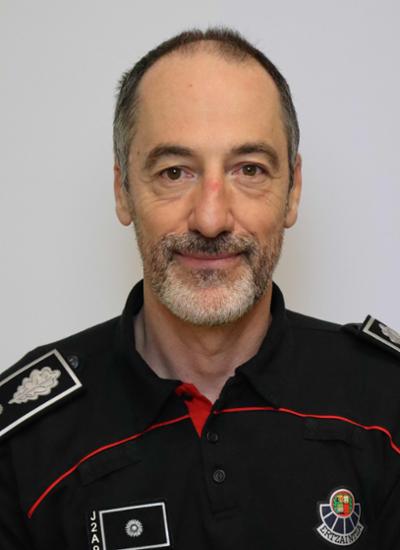

Aitor Ercilla: Our presence at SICUR consolidates the image of the Ertzaintza as a comprehensive police force
The Ertzaintza remains committed to innovation and continuous improvement, shaping a research model supported by intelligence and aimed at improving the level of service and efficiency, according to Aitor Ercilla Villabona, head of the Cybersecurity Coordination Unit, in the following interview. Furthermore, he explains that "we have always valued our presence at the SICUR fair very positively because of the opportunities it gives us to consolidate our institutional image as an integral police force, responsible for the security of the Basque Country".
What instruments does the Ertzaintza use to offer a police model that is close to the public and provides a public service?
The Ertzaintza, as the integral police force of the Basque Country, was born with a vocation for public service that shapes and determines its commitment to the society it serves. In this sense, citizenship is the main focus of our action, through a comprehensive security model designed so that all people can enjoy the full exercise of their rights and freedoms and develop their lives in spaces of coexistence in peace, well-being and social cohesion, reducing as far as possible the risks and dangers that could disrupt their rights and freedoms, their safety and that of their property and collective heritage. In this regard, understanding citizens' needs and adapting public services accordingly—along with identifying problems, planning responses, and subsequently evaluating results—is essential to offering a comprehensive policing model that is close to the public.
Based on all of this, the General Public Safety Plan of the Basque Country enables the implementation of cross-cutting security policies that are aligned, coordinated, and prioritized to effectively address the new challenges we face, always from a broad and comprehensive perspective on security.
What role does technology play in proactive prevention?
Basque society, as rightly pointed out by the Basque Government’s Security Minister, Bingen Zupiria, during the presentation of the Department of Security’s strategic lines for the 13th Legislature, is in constant evolution. In this new context, the adaptability of the Ertzaintza and the efficient and rational integration of new technologies is crucial in effectively responding to a rapidly and continuously evolving threat landscape.
To this end, the Ertzaintza has implemented mobile technological solutions to provide greater autonomy to officers, both in preventive actions and in responding to incidents and criminal acts. Necessary actions have been reinforced to ensure an adequate information security policy, and technological systems have been enhanced to monitor transportation routes for traffic management and road safety, as well as for police and emergency use. Ultimately, a highly effective model for managing innovation and improving security has been designed.
What innovative elements have been introduced in criminal investigations, and what results have been achieved?
One of the guiding principles for identifying the challenges we face as a comprehensive police force is maintaining a commitment to innovation and continuous improvement. With this aim, in recent years the Ertzaintza has been shaping an intelligence-supported investigation model focused on improving service levels and efficiency. This includes access to specialised knowledge to respond to new or highly complex types of crime, and the approval of specific plans for investigating both these new criminal modalities and those with the greatest impact on public safety.
Likewise, the structure of the Ertzaintza has recently been updated to provide an appropriate response to the magnitude of both current and future security challenges faced by Basque society due to the progressive digitalisation of personal relationships and various types of transactions. In this way, it optimises the fight against increasingly complex, sophisticated, and cross-cutting types of crime, which have a growing economic and social impact. The goal is to improve both the qualitative and quantitative results of police work, as well as citizens' perception of security. For all these reasons, and in order to provide the fight against cybercrime with proper organic and operational unity, the Cybersecurity Coordination Headquarters of the Ertzaintza has been created. It has an inherently comprehensive and cross-disciplinary character, with the capacity not only to detect, prevent, and prosecute cybercrime but also to establish effective coordination with the Basque Cybersecurity Agency and other European and international agencies.
How is this headquarters structured?
In addition to an investigative section with reactive and operational capabilities, the headquarters also includes a coordination and innovation section, with proactive capabilities and responsibilities, particularly in areas related to cooperation, innovation, and coordination. Specifically, it promotes the operational activity of the Ertzaintza regarding the application of new technologies, especially in all matters related to cybersecurity, cyber intelligence, internet tracking, and the fight against cybercrime. It is also responsible for training in all these areas. This section is established as the unit responsible for assisting the Ertzaintza's Headquarters in the coordination, supervision and evaluation of activities across all divisions, central units, territorial units, and the rest of the Ertzaintza's departments and units within the aforementioned areas.
Among other functions, this section promotes and enhances—together with the External Cooperation Headquarters—relationships with other public and private institutions at both national and international levels in the fields of cybersecurity, innovation, artificial intelligence, new computing technologies, and the fight against cybercrime. It also works closely with the Central Intelligence Office in monitoring, evaluating, and analysing information available online to generate cyber intelligence in the field of investigation.
It is also important to highlight the creation, through Law 7/2023 of 29 June, of the Basque Cybersecurity Agency, aimed at ensuring that the Basque Government has the tools and resources necessary to face the threats and risks in the field of cybersecurity that arise in today’s information society. Furthermore, the Basque Cybersecurity Strategy for 2024–2029 was recently published. It seeks to make Euskadi a cyber-resilient region, with the capacity to protect both its public administration and business sector from cyber risks.
What are the main challenges and priorities for the Ertzaintza this year?
As explained by the Basque Government's Security Minister during the presentation of the Department of Security’s strategic lines for the new legislature, the current Basque Security Plan (2020–2025) is being evaluated. This evaluation will serve as the foundation for designing a new Security Plan for the years 2026–2030, which will update the risks and threats we face as a society and assess the means and resources we will need to address the new challenges. This new plan, which will be one of the main strategic projects of this legislative term in the field of security, will define the lines, initiatives, and actions for the coming years—always, as Mr Bingen Zupiria rightly said, with a broad and comprehensive vision of security.
In this regard, the ongoing training of security and emergency professionals is of particular importance to respond with the level of excellence that Basque society demands; the promotion of initiatives to increase the feeling of safety in Euskadi; the adaptation of the current structure of the Ertzaintza to the new challenges required by Basque society; the provision of new technological tools to optimize the services provided; progress in integrating the Basque Police and Emergency Network with other regional, national, or international organizations and entities; the promotion of cyber intelligence; and strengthening the capabilities of the Basque Cybersecurity Agency to detect alerts and respond to incidents.
To all this must be added service improvement and updating in line with the current criminological reality; the development of a security system with a gender perspective; and initiatives to achieve comprehensive and interconnected security. These include exercising responsibilities in the protection of critical infrastructure and coastlines, facilitating access to international information sources, and improving coordination among the police forces of Euskadi, among others.
What collaboration exists with other security forces and the private security sector?
Nowadays, a comprehensive security strategy cannot be successfully implemented without proper collaboration with other security agencies and public and private institutions, both at the national and international level. In this regard, the Ertzaintza has always been committed to establishing and maintaining institutional cooperation relationships, including at the international level, that allow our institution to participate and be represented in all areas within its remit. It actively engages in various mechanisms through which different police forces and institutions exchange knowledge, experiences, and/or general relations.
In addition, the Ertzaintza has a formal system for the exchange of criminal information with other police forces, both nationally and internationally. It also participates in operational exchanges with national and supranational single points of contact, embedded within the different instruments and legal frameworks for European and international police cooperation.
On the other hand, regarding the private security sector, it should be remembered that Law 15/2012 of 28 June on the Organisation of the Public Security System of the Basque Country, already emphasised that security administration should not be limited to the strict administrative control of private security activities. Instead, it must aim to integrate the contributions of the private sector into the broader public security system, implementing not only control measures but also actions aimed at ensuring effective collaboration.
For this reason, the Department of Security maintains an excellent relationship with the private security sector, reaffirming the Ertzaintza's involvement in private security activities, gaining access to relevant information generated within them that is important for public safety, and playing an undisputed leading role. The Ertzaintza maintains constant contact with the sector to strengthen the principles of coordination and cooperation. Finally, the necessary mechanisms have been established to ensure smooth two-way communication at various levels. In this sense, several lines of action have been developed, such as designing specific protocols for each sector and professional category, sharing information, and establishing partnerships and procedures for action in specific areas and issues.
Ultimately, efforts continue with the sole aim of improving public safety through information sharing, collaboration, cooperation, and coordination with public and private entities, security agencies, and the private sector—always from the standpoint of our commitment to society and with the utmost institutional loyalty.
How does the Ertzaintza view its participation each year at the SICUR fair, and what proposals and innovations does it usually present there?
The Ertzaintza has always held its participation in the SICUR fair in high regard, as it provides valuable opportunities to consolidate our institutional image as a comprehensive police force responsible for the safety of Euskadi. Particularly noteworthy is our presence with our own stand, as well as our active participation in the various forums and activities held in parallel at the fair, where we often reflect on the most strategically relevant aspects for our institution.
To this end, the presence of Ertzaintza specialists at the different events, official visits by senior officials from the Basque Government’s Department of Security, visits to Basque companies exhibiting at the event, and, in general, the opportunity the fair provides to strengthen and consolidate relationships with various public and private institutions, security agencies and the private security sector, are all highly valued by our institution.





